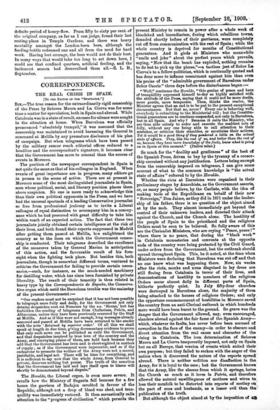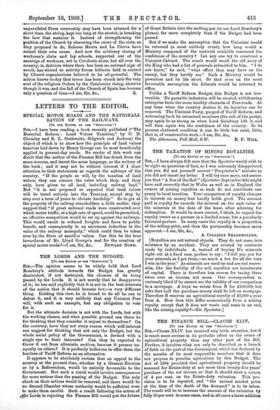CORRESPONDENCE.
THE REAL CRISIS IN SPAIN.
[To THE EDITOR OF THY "SFECTATOR."] SIR,—The true reason for the extraordinarily rigid censorship of the Press by Senores Mann. and La Cierva was for some time a matter for speculation, both in Spain and abroad. While
Catalonia was in a state of revolt, excuses for silence were sought in the situation at home. When Barcelona was officially pronounced " absolutely tranquil," it was assumed that the censorship was maintained to avoid harassing the General in command at Melilla by any premature disclosure of his plan of campaign. But when telegrams which have been passed by the military censor reach editorial offices reduced to a headline and the correspondent's signature, it becomes clear that the Government has more to conceal than the course of events in Morocco.
The position of the newspaper correspondent in Spain is not quite the same as that of his colleague in England. When events of great importance are in progress, many editors go in person to the scene of action. There are at present in Morocco some of the most distinguished journalists in Spain, men whose political, social, and literary position places them above suspicion. No one is more ready to acknowledge this than their own political opponents in the Press, and we have
had the unusual spectacle of a leading Conservative journalist so free from professional jealousy as to invite a Liberal colleague of equal distinction to accompany him in a convey- ance which he had procured with great difficulty to take him within reach of an expected action. The fact that these two journalists jointly obtained certain intelligence at the risk of their lives, and both found their reports suppressed in Madrid
after getting them passed at Melilla, has enlightened the country as to the lines on which the Government censor- ship is conducted. Their telegrams described the excellence of the measures taken by General Marina in anticipation of this action, and the favourable result of his fore- sight when the fighting took place. But besides this, both journalists, though in somewhat different terms, ventured to criticise the Government for failing to provide certain neces- saries,—such, for instance, as the much-needed machinery
for distilling water, which has since been furnished by private liberality. The result of their temerity is thrift related in heavy type by the Carresponderecia de Espaiia, the Conserva- tive organ which until the Barcelona trouble was the mainstay of the present Government:— " Our readers must not be surprised that it has not been possible to telegraph more fully and daily, for the Government not only detains despatches sent via Nemours by the s.s. Sirena,' but has forbidden the sending of telegrams from Chafarinas, Pefion, and Alhucemas, unless they have been previously censored by the Staff at Melilla. And as if this were not enough, long messages already censored and passed at Melilla have been returned to the sender with the note 'Retained by superior order.' Of all this we shall speak at length in due time, giving documentary evidence to prove that only such news can be published as suits the Government, and that despatches inspired by true love of the country and the Army, and conveying praise of them, are held back because they add that the Government has been and is short-sighted in matters of supply ; as if the Government were impeccable, and as if the endeavour to promote the welfare of the Army were not a sacred, justifiable, and legal act. There will be time for everything, and it is sufficient to say now that the whole Army, from General to private, deserves nothing but praise. The truth of the assertion that the Government has laid and lays itself open to blame will shortly be demonstrated beyond dispute."
The Hera/do, the Liberal organ, is even more severe. It recalls how the Ministry of Sagasta fell because for a few hours the garrison of Badajoz revolted in favour of the Republic, although not a drop of blood was shed, and tran- quillity was immediately restored. It then sarcastically calls attention to the " progress of civilisation " which permits the present Ministry to remain in power after a whole week of bloodshed and incendiarism, during which rebellious towns, denuded shortly before of their garrisons, were completely cut off from communication with the rest of Spain; while the whole country is deprived for months of Constitutional guarantees. And it girds at Ministers who meanwhile "smile and joke" about the perfect peace which prevails, saying, " Now that the bomb has exploded, nothing remains to do but to pick up the pieces,"—a tactless jest of S.eiior La Cierva's to a fellow-politician, which is continually quoted and has done more to inflame resentment against him than even his praise of the " admirable government of Barcelona under Senor Osorio" three days before the disturbances began:— " Well," continues the Herald°, "this genius of peace and hero of tranquillity expressed himself to-day as highly satisfied with the attitude of the Press, saying that it could not be more docile, more gentle, more temperate. Then, thinks the reader, the Minister agrees that an end is to be put to the present exceptional circumstances. But that no, never ! Every one is behaving well, everybody is submitting to the Ministerial will ; but the Constitu- tional guarantees are to continue suspended, not only in Barcelona, but in all Spain. And why P Because it suits the Ministry, who are thus able calmly to order and execute the maddest acts of folly, without any one being able to call attention to their mistakes, or criticise their stumbles, or scrutinise their actions. Yet it would be a good thing if they pondered a little on the actual state of affairs. They, like the rest of us, and better than the rest of us, because they have more knowledge of the facts, know what is going on in Spain at this moment." (Italics mine.) So much for the " docility and gentleness" of the best of the Spanish Press, driven to bay by the tyranny of a censor.
ship exercised without any justification. Lettere being exempt from the censorship imposed on telegrams, I can give some
account of what to the common knowledge is "the actual state of affairs" referred to by the Herald°.
Whether the riots at Barcelona were organised in their preliminary stages by Anarchists, as the Government asserts, or, as many people believe, by the Carlists, with the idea of making tools of the Republicans on behalf of their new " Sovereign," Don Jaime, as they did in 1871 under the leader- ship of his father, there is no question of the object aimed at by the mob. They almost immediately got beyond the control of their unknown leaders, and directed their attack against the Church, and the Church alone. The hostility of the people of Spain to the priesthood and the religious Orders must be seen to be believed. So fully aware of this are the Clericalist Ministers, who are crying "Peace, peace I" where there is no peace, that during the " black week" in Catalonia monasteries and convents at the opposite ends of the country were being protected by the Civil Guard, under orders from the Government, lest the outbreak should.
spread throughout Spain. This, be it noted, at the time when Ministers were declaring that Barcelona was cut off and that no one knew what was happening there. Now, six weeks after the riots, monks and nuns disguised in lay dress are still fleeing from Catalonia in terror of their lives, and demonstrations of hostility to members of the religions Orders occur almost daily in different parts of Spain, hitherto perfectly quiet. In July fifty-four churches were destroyed in Barcelona alone, the majority of them being attached to the houses of religious Orders; and only the opportune commencement of hostilities in Morocco saved the country from an anti-Clerical outbreak in which hundreds more would have been burnt to the ground. So grave was the danger that the Government allowed, nay, even encouraged, slanders abroad against the fair fame of the Spanish Army— which, whatever its faults, has never before been accused of cowardice in the face of the enemy—in order to obscure and divert attention from the real cause and character of the rising in Catalonia. The iron determination of Seiiores Mauro and La Cierva temporarily imposed, not only on Spain
but on all Europe, that version of events which suited their own purpose; but they failed to reckon with the anger of the nation when it discovered the nature of the reports spread. abroad. There is neither sedition nor disaffection in the Army, for it is loyal to the core ; but the Government knows that the Army, like the classes from which it springs, hates the Church as much as it loves la Patria, and therefore allowed the natural unwillingness of mothers and wives to lose their menfolk to be distorted into reports of mutiny on the part of sons and husbands, as a lesser evil than the publication of the truth.
But although the object aimed at by the imposition of atz
unparalleled Press censorship may have been attained for a short time, the string, kept too long at the stretch, is breaking the bow that sustains it. Instead of strengthening the position of the Church by obscuring the cause of the riots, as they proposed to do, Senores Maura and La Cierva have rained their own cause. And now the arbitrary closing of workmen's clubs and lay schools, supported out of the earnings of workmen, not in Catalonia alone, but all over the country, in districts where there has been no outward sign of revolt, has stirred to activity forces hitherto held in control by Church organisations believed to be all-powerful. The nation knows to-day that terror has been struck into the very soul of the religious Orders by the Catalonian rising, abortive though it was, and the fall of the Church of Spain has become only a question of time.—I am, Sir, &c., Z.











































 Previous page
Previous page